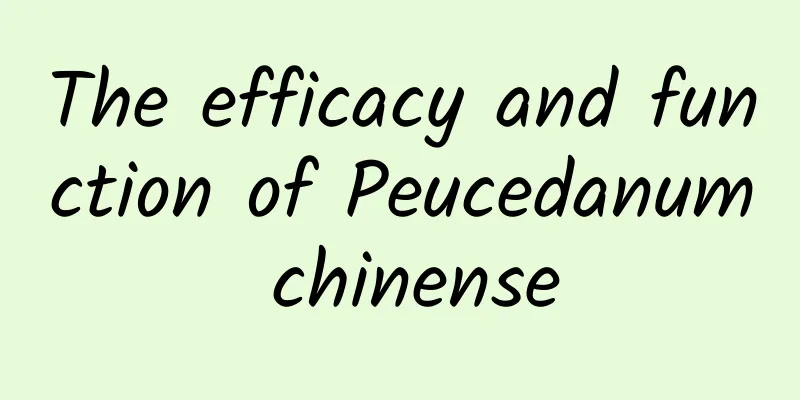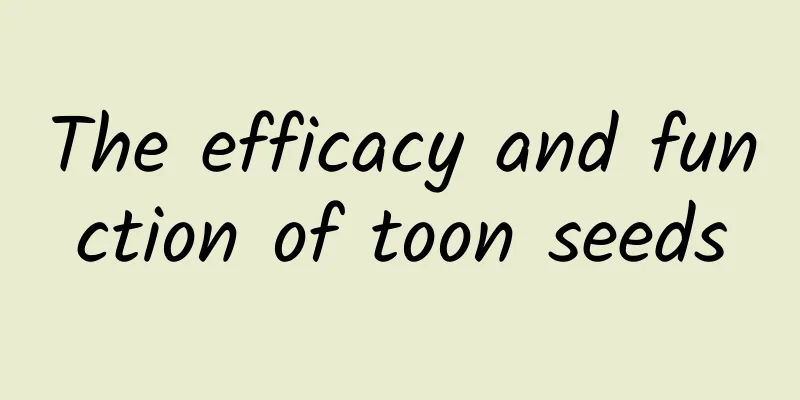The efficacy and function of Peucedanum chinense

|
Peucedanum chinense is a common Chinese medicine in clinical practice and has high health value. For people with poor physical constitution, eating Peucedanum chinense can greatly improve their physical health. Today I will introduce Peucedanum chinense to you. [Other names] Peucedanum chinense, red Peucedanum chinense, feather-splitting Ligusticum chuanxiong, Peucedanum yunnanensis [Source] Medicinal material source: It is the root of Ligusticum chuanxiong, a plant of the Umbelliferae family. [Original form] Perennial herb, 15-60cm high. The roots are thin and cylindrical, up to 10 cm long, with the root neck densely covered with residual withered leaf sheath fibers. The stem is thin, solitary, branched, cylindrical, longitudinally grooved, glabrous or pubescent. The petiole of the basal leaf is 8-18cm long, the leaf blade outline is ovate to triangular-ovate, three to four times pinnate-lobed, with 5-6 pairs of pinnae, the terminal segment is linear, 1-3mm long and 1-2mm wide, and the petiole of the stem leaf is completely sheath-shaped. The compound umbel is split into narrow lobes with short soft hairs on the outside; the rays are 14-23, spreading and recurved outwards in fruiting period; the involucral bracts are 8-10, deeply pinnately divided; the calyx teeth are obvious; the petals are white inside and often purple outside, long ovate; the style base is raised, the bilaterian fruit is oblong, 6-8mm long, 3-4mm wide, the dorsal ridge is slightly raised, and the lateral ridges are expanded into narrow wings; there is 1 oil tube in the dorsal groove, 2-3 oil tubes in the lateral grooves, 4-6 oil tubes on the commissure, and the ventral surface of the embryo is straight. The flowering period is July-August, and the fruiting period is September-October. [Habitat distribution] Ecological environment: Growing on hillsides, grasslands, and mountain jungles at an altitude of 2500-4000m. [Chemical composition] The root contains coumarins: daucoidin A and B, columbianadin, isoedultin, archangelicin, bergapten and non-coumarins: ferulic acid, falcarindiol, cerotic acid, β-sitosterol and daucos-terol. 【Nature and flavor】 Bitter; pungent; cool 【Functions and indications】Disperses wind and clears heat; relieves qi and eliminates phlegm; activates blood circulation and regulates menstruation. Mainly used for colds; headaches; coughs, asthma, and sputum; abdominal distension, vomiting, and nausea; irregular menstruation; injuries from falls; and fractures [Usage and Dosage] For oral use: decocted in water, 3-9g. For external use: take appropriate amount and mash it for application. 【Excerpt】 Chinese Materia Medica The above is a brief introduction to the effects of Peucedanum chinense. I hope it can help all my friends. Generally speaking, the health-preserving effects of Peucedanum chinense are very powerful. Therefore, you can use Peucedanum chinense in daily life to better promote your health. |
<<: The efficacy and function of winterberry leaves
>>: The efficacy and function of Bai Duhuo
Recommend
What are the effects and functions of earth thought?
Di Nian is a wild plant. It is mainly used as med...
The probe is aimed at the Jupiter system, and humans are relentlessly pursuing distant mysteries
Recently, the European Space Agency's Jupiter...
The efficacy and function of Dahuashishanglian
The efficacy and function of the traditional Chin...
What medicinal value does toad have?
Toads, also known as toads, I remember when I was...
Implement the "Dual Carbon" Action to Build a Beautiful Home
Source: Xinhuanet...
Indian e-commerce market report 2022-2030
By 2030, the number of Internet users in India is...
Red Duck Side Effects
Red Duck is mainly used as a medicine to treat sy...
70 years ago, two young men made a groundbreaking discovery that led to global life sciences
Introduction This year marks the 70th anniversary...
Gold orchid has an effect on rheumatism
Golden orchid is an ornamental plant that is drou...
The efficacy and function of golden cherry blossom
Do you know what golden cherry blossoms are? If y...
Niuhuang Jiedu Tablets
Speaking of the medicine Niuhuang Jiedu Tablets, ...
Can having a cold reduce the risk of COVID-19 infection? The truth is not necessarily that simple
Some studies in the past two years have found tha...
Can eating spicy food inhibit Helicobacter pylori, reduce the risk of gastric cancer, and help lose weight? But there is a problem...
Expert of this article: Fu Shufang, Master of Foo...
Ledgers, Hounds, and Boars
Wang Youqin lost confidence in farming after thre...
The value of natural mineral water lies in the "mineral" it contains. Are you drinking it right?
With the arrival of World Water Day on March 22, ...









